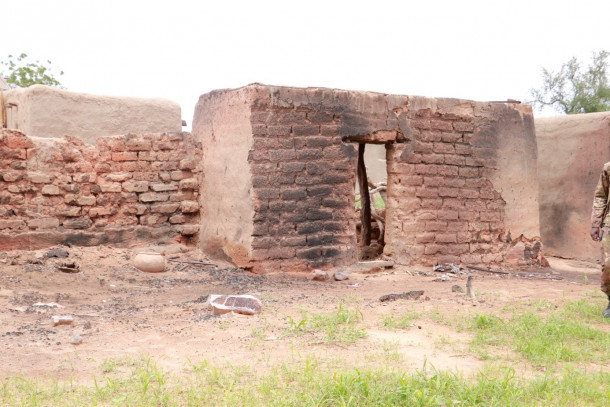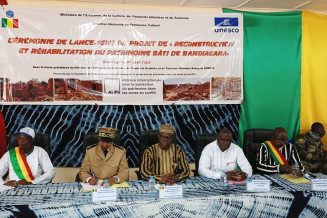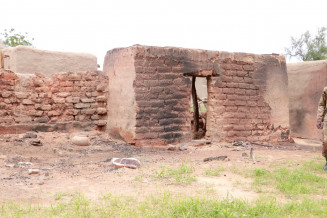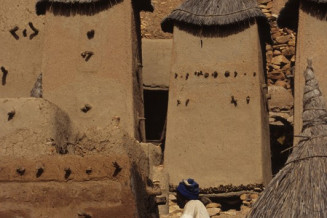Article
Launching of the rehabilitation of the Cliff of Bandiagara World Heritage Site (Land of the Dogons)

On 15 August 2022, the Ministry of Craftwork, Culture, Hotel Industry, and Tourism of Mali, organized the official launching ceremony of the project for the reconstruction and rehabilitation of the built heritage of Bandiagara, led by the United Nations Educational, Scientific and Cultural Organization (UNESCO) and financed by the International Alliance for the Protection of Heritage in Conflict Areas (ALIPH).
The project was initiated in 2019 following the partial or total destruction of several villages in central Mali, and benefits the communities of four villages, namely Ogossagou, Sobane da, Djombolo and Tégourou, located within the Cliff of Bandiagara World Heritage Site (Land of the Dogons) and its enhanced protection zone ("buffer zone").
The project foresees providing training to the local communities through training-schools aimed at rehabilitating or rebuilding approximately 125 houses and 125 granaries, as well as 8 togunas, or traditional palaver huts, open wooden constructions erected in the center of Dogon villages, where the elders meet to share or discuss community problems. It also includes the collection and inventory of cultural and ritual objects, as well as actions to support local communities.
Despite the difficult security situation, the authorities and the population mobilized themselves to welcome the partners in a festive atmosphere tinged with hope for the reconstruction of the destroyed assets, and the revitalization of tourism and craftwork in favor of the local economy. The initiative can only be successful through the strong involvement of local communities, bearers of this heritage and main victims of the impacts of the conflict on culture.
“We thank UNESCO and ALIPH for their attention to us. This project is very welcome. The need goes beyond the four villages: we hope that peace will soon return in order to resume our work in the fields. On behalf of all the villages, I thank all the delegations and appreciate the commitment of the local authorities,” said Mr. Odi Djiguiba, representative of the beneficiaries.
On the occasion of the ceremony, the Minister of Craftwork, Culture, Hotel Industry, and Tourism, the Governor of the Bandiagara region, the mayors of Sangha, Bankass, Doucoumbo, and Bandiagara, as well as the UNESCO representative in Mali, handed out supplies to the local communities in order to alleviate the hardships generated by this period of crisis, particularly difficult for farmers and inhabitants of the region.
The launch of this initiative was a sign of hope and support from UNESCO, as international partner, to the communities, which have been affected by the conflict for a decade. "The site of Bandiagara is known for its great beauty but also for its soul, which is perpetuated by the local populations, who must be the ultimate actors and beneficiaries of this project," said Mr. Valery Freland, Executive Director of ALIPH.
The site of Cliff of Bandiagara was inscribed on the World Heritage List in 1989 as a mixed property. It covers an area of 400,000 hectares and includes 289 villages. Some communities living on the site express the close relationship that binds them to their environment through the sacred traditions and rites still alive. Since 2019, the ongoing conflict in the region has severely affected around 30 villages in the site.






